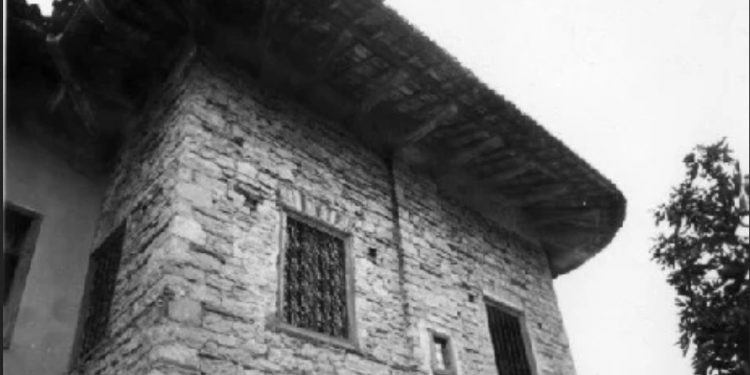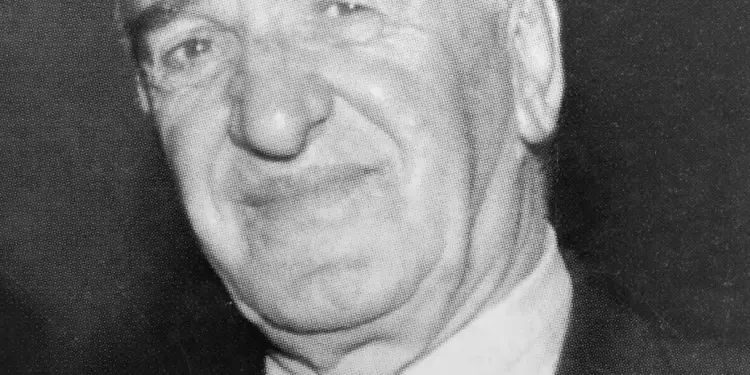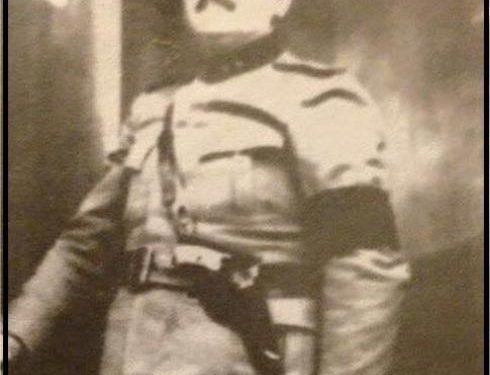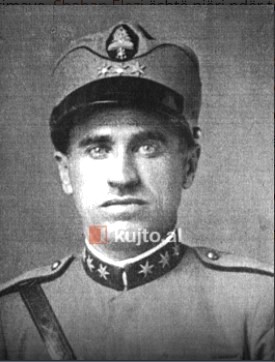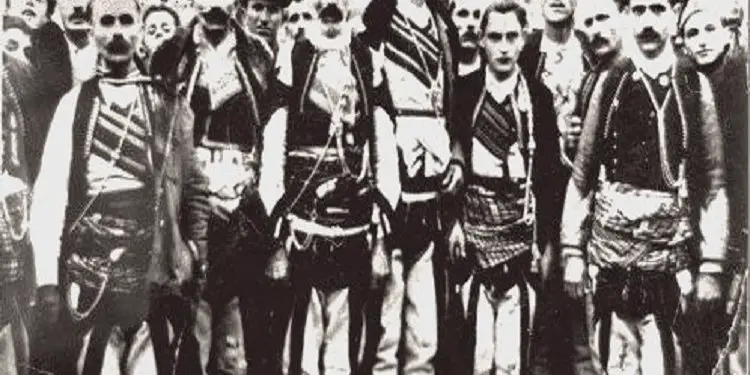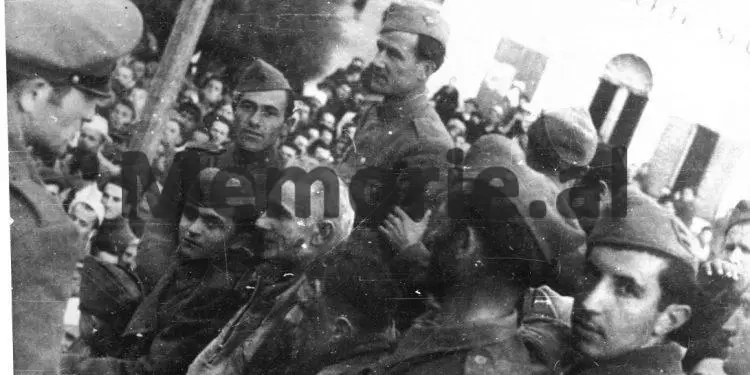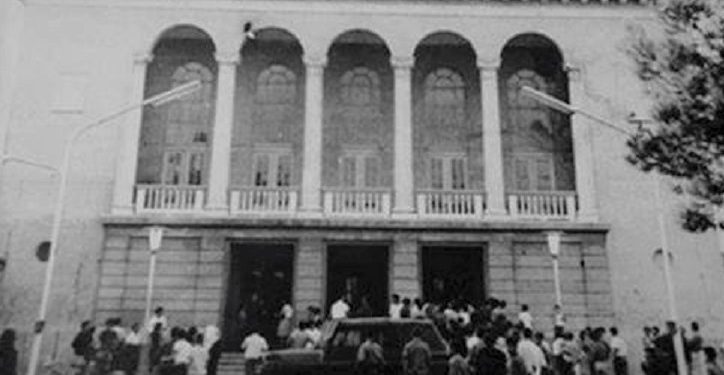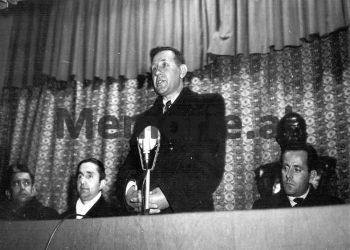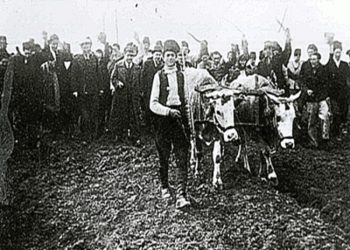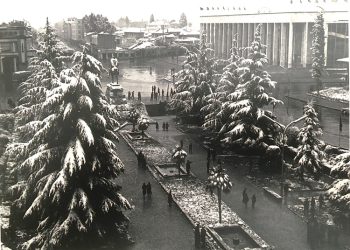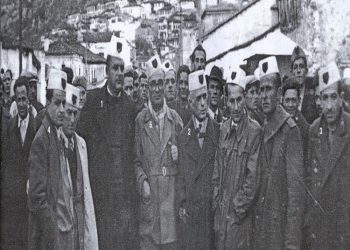By Ahmet Bushati
part ten
Memorie.al/After the flag was altered in 1944 with the addition of the communist star, Shkodra transformed into a center of resistance against the regime, paying a high price for its tradition of freedom. By April 1945, high school students, already feeling betrayed by the promises of the war, gathered to oppose the new terror that imprisoned and killed innocent people. Communism turned Kosovo into a province of Yugoslavia, while Shkodra was punished for its “historical crime”- its defiance against invaders. The “Postriba Movement” became a tool to suppress all dissent, plunging the city into an unprecedented spiral of suffering: imprisonments, executions, and the destruction of families. The high school students, alongside citizens, became symbols of resistance, while some “young communists” turned into tools of the State Security, leading to expulsions, imprisonments, and internments.
Four times, Shkodra rose in armed rebellion, but history forgot these battles. This book is written to remember the countless prisoners, the tortured, the killed, and the parents who suffered in silence. It is a warning against dictatorship and a plea for future generations not to forget the sacrifices made for freedom.
Continued from the previous issue
In the Footsteps of a Diary
Shkodra in the first years under communism
Cen Taga, the brave man from Kruja!
The events of Kelmendi are also linked to the name and life of a brave and patriotic Krutani, Cen Taga. Kelmendi, for his part, is indebted to him with gratitude. This brave son of the Kruja region, when he was a student at the Tirana gymnasium during the occupation, had abandoned school like many other young men, and gone to the mountains as a partisan. As such, he had distinguished himself so much in combat actions that in Kruja he would be told that he had been the bravest partisan. The war, at its end, had produced an officer with the rank of lieutenant.
If he had also been involved in the events of Kelmendi, he would have disappointed and killed them in spirit for the numerous atrocities that the partisans were committing. It would be especially saddening that last day, when he moved them somewhere not far from the cave, he had watched the entire scene unfolding at its entrance. Shaken by the pain for the mountaineers betrayed by his deceitful superiors, he had abandoned his duty on the spot and sent Kelmendi to his area of Kruja, to join the fugitives there.
Deep in the snow-laden and ice-covered peaks of the high Qafë Shtama and precisely in the forests of Llapushi, he would seek and find his fellow citizen of the People’s Defense forces, as well as the great severity of that winter, the brave and honorable patriot, Ibrahim Kupi. The constant pursuit of them had forced them one day to enter the city of Kruja and precisely in the house of a citizen and friend of theirs, by the name of Sabri Kau.
They would happen to be in this house at a time when “people’s trials” were being held in Krujë, as elsewhere in Albania. The people of Krujë tell how their husband Ibrahim Kupi, more than once, had difficulty restraining Cen Taga, who, dressed as a peasant and wrapped in bombs around his body, had decided to enter the courtroom and kill everyone he could: first the jury, then those present who had been invited there, and finally himself.
One night in spring, Ibrahim Kupi and Cen Taga realized that they were surrounded by the Persecution Forces and, in order not to bring consequences to the house where they had found food and shelter until then, they managed to secretly leave it and quickly descend to a stream somewhere nearby, heading for a cave, where they would make their last stand. Nothing would prevent them both, after a long fight, from being killed like the rare braves they were, not even when the partisans had placed Ibrahim Kupi’s six-year-old son between the warring parties.
Captain Shaban Elezi, one of the first victims of betrayal!
Terror and violence were increasingly darkening the atmosphere in Shkodra. As soon as you heard that one person was imprisoned, you would also hear about the murder of another, known or unknown. Shocking events would follow one another, instilling much fear and sadness in the people. Such a situation had also begun to generate betrayal, with one of its first victims being the man of duty and the loyal legalist, Captain Shaban Elezi.
On January 17th after lunch, by chance in the “Rus” neighborhood – where the music school is today – I saw with great regret Shaban Elez, who was being brought to be bound from Malësia, where he had been taken. Qamil Gavoçi, who at that time commanded the Pursuit Forces, had put his arm around him and was walking with him on foot, so that the people could see him. All around them were partisans with automatic rifles in their hands, whose faces seemed to show that they felt proud of the success they had achieved.
However, I was struck by the rather natural and carefree attitude of Shaban Elez himself, which, in addition to his face, was also shown by his relaxed gait. It occurred to me that this calmness came from the trust he might have in Qamil Gavoçi, in whose trust I thought he had not surrendered.
The next day, the newspaper “Jehona e Shkodras” would write about this event: “… that in the village of Leporosh in Mbishkodra, the criminal Shaban Elezi was captured by about thirty partisan forces, with Commander Zenel Muho”! The truth was that Shaban Elezi was caught by surprise and had no chance to react, as a result of the deception on the part of his two close friends, the brother between them, Nel and Selim Zeqiri, as well as the son of the former named Çelë.
At the beginning of the ninety days, and precisely on January 26, 1945, eight men would be shot in front of the Municipality, among who was Shaban Elezi, who they said that after being knocked down by bullets, he did not even try to get up again with a smile on his face.
I take this opportunity to show the extent of the persecution that his family suffered: Smajli, who in the Koplik war of 1920, together with Shaban, his brother, had fought with weapons to defend our lands against the Montenegrins, and who during the Italian occupation, would spend two years in prison and exile in Italy, would also suffer the prison of the communists, like Shaban Elezit’s brother who had been, and one day would even die in prison.
It can be said without fear that for those with whom he knew and suffered, he was one of the angels of the prison, although, as they say about him, he was very fierce in cases of fighting, as well as in any case when he suspected that the life of his brother, Shaban, who had been his shield at the time, was in danger. When we were in prison, it would be enough to look at Smajl Elezin’s face to immediately receive a sincere smile from him, which would express only kindness. That man could never have had any other appearance, to remain in everyone’s memory only as that.
Years later, Shaban Elezin’s two sons, Qemali and Ruzhdia, when they grew up, would serve ten and eighteen years in prison respectively, where the latter would also acquire a strong psychological depression, from which he would never escape, that Ruzhdi who was known by everyone as having come into life with his only inclination and dream, to sing with his only voice, as sweet and delicate as he was as a person and a structure.
Smajl’s family was interned and his son Ymeri would serve ten years in prison. A third brother, Bajrami, would die young, and on that occasion it is said in Shkodra that he did not die, but burst. His son, Aliu, would not escape without having served five years in prison. No matter how much people have known and suffered the communist curse, when they learn of the tragedy of this peaceful and patriotic family, they may ask:
“What special debt did this family, even its leader, Shaban Elezi, owe to the communists?! Why would he, if he had headed a gendarmerie school since after the Congress of Lushnja, have served the new Albanian state with loyalty and dedication, in defense of its law and order everywhere in Albania?! Why would he, even during the period of occupation, persecuted as he had been by the Italians, remain lost somewhere in Malta, waiting for the day when Albania would regain its freedom?!
And finally, why did he, during the year 1944, having responded to the call of his party, that is, as a patriot and legalist, take up arms at a time of great danger to the state and homeland? Of course, for these and nothing else, Shaban Elezi would be killed and his family would suffer an endless ordeal of great suffering.
Eight men are shot in front of the City Hall and in the presence of the people!
Although communist barbarity had gained momentum every day and was increasingly revealing its unbridled cruelty without mask or reserve, there was a constant movement of many people through the streets of the city of Shkodra, especially in those of the center. Since the schools continued to remain closed, students, including university students, who had returned to their homeland due to wartime circumstances two years earlier, would continue to be the regular “subscribers” of Shkodra’s square.
Their number would be increased by a mass of former civil servants who were waiting to be replaced, as well as numerous other unemployed people, among whom were also members of families participating in the war, who wanted to be present at every event, and finally, without excluding the partisans coming from the south, who generally had nothing else to do. A part of this mixed mass of people would fill the small square in front of the City Hall on the morning of January 21, 1945, for a rally announced the day before, as “important”!
The weather, although sunny, was cold. The people gathered in the small square in front of the City Hall, did not wait long, and up there on the balcony appeared a smiling officer with the rank of colonel, who seemed older than the other officers in age. He was closely accompanied by Arif Gjyli, who introduced himself to the people by the name of Shefqet Peçi, who in turn began to speak with a regular oratory, alternating tones as needed, without lacking, so to speak, even a hint of inspiration, accompanied by quite demonstrative gestures, which were needed in the ordinary speeches of the inexperienced and insufficiently educated orators of those days.
He spoke briefly to the people of Shkodra about the National Liberation War and the freedom gained from it, about the fraternal ties between the Albanian and Yugoslav partisans, about their common ideals and about the blood they were shedding in the same trenches, and after a few minutes he would close his speech with unstinting praise for Marshal Tito, then, taking on a more open appearance and with readable boasting and irony, he would continue in an even louder voice: “We have brought here some spies and some traitors in the service of the foreigner who had stained their hands with the blood of the sons of the people, whom we will shoot now, here in front of you”; and suddenly he began to read the names of those unfortunates who had brought treason against the people and behind their backs.
When, as if in turn, he pronounced a name somewhere halfway down the list, a little girl of ten or twelve years old, who happened to be sitting next to me, who had a very fresh and clean appearance and who was also beautiful, wearing a new red coat, as soon as she heard that name, she burst into such a frenzy that she believed everyone around her fainted.
Her shrill cries of “Father, father, father!”, drowned in oil, and the sudden bursts of automatic rifle fire, caused the terrified crowd, emitting a deafening scream, to try to flee in panic, not daring to raise their heads towards the eight men, still bound together, who had fallen into a pool of their own blood.
I, too, was prevented from leaving by the chaos that had ensued, and as if by accident, I happened to notice behind me a citizen, with a revolver (“Beret”) in his hand, shooting at one of the victims, supposedly to take the blood of his brother killed last summer by the police, and likewise, my eyes would catch Qamil Gavoçi, who, as if after another, was giving the victims a bullet behind the ear, a “colpo di grazia”.
This macabre scene, treacherously planned by the communist rulers, with the aim of terrorizing the people of Shkodra, would never be erased from his memory. The citizens of Shkodra, from then on and for fifty years in a row, would whisper in their comrades’ ears: “Oh, my God kill them, what are they doing to this people”! – without ever deigning to mention the real names of the regime’s people, whose mass they would constantly replace with the pronoun “them”, with strong contemptuous semantics.
Among those shot that day, I remember Shaban Elez, Elez Hoti, Adem, Hasan Isufi’s nephew, captured and wounded in the fighting on Mount Kolaj a few days earlier, and Dede Shaban, the Kosovar Shefki in the service of the Germans, among the eight who had been there in total.
An undeserved end, for Sylço Beg Bushati!
A few days before the partisans entered Shkodra, Xhelali, the second son of Sylço Bey, would not leave Shkodra with a German convoy, without asking to take his father with him. That day, as the few minutes he had at his disposal were rapidly approaching their end, he would kneel before his father as before God, and would continue to beg him: “Oh, father, come with me! You don’t know the communists, they will kill you for a joke, come with me”! Sylço Bey, for his part, would respond to his son’s repeated pleas, albeit coldly and with a soft tone, but firmly: “I am old and the roads are not for me. I cannot leave the country. I want to die here”!
Sylço Bey, with more than eighty years on his shoulders, had been the leader of the country for many years and was respected and honored like no other in Shkodra. Raised according to strict moral norms within a closed and very conservative environment of Shkodra, the idea of leaving it could not even be perceived by him. Then he was also a blind religious man who believed in the predestination of fate for every person. Thus, his age and mentality made every prayer of his son to leave Shkodra the most futile attempt on this earth.
Strongly attached to Shkodra as the center of the world that should have been after him and his unwavering faith in God, on the evening of November 28, 1944, he, accompanied by his brother, Sheuqet beg Bushati, dueled from the house with a stick in his hand, heading towards his nephew Myfiti, who lived alone with his mother. Later, Myfiti himself would say: “As long as my uncle was with me, he was not late for anything, so much so that he even missed his sleep.
For whatever he heard happening outside, he would say: “In the hands of God, how could He have a name”! He categorically ruled out the possibility of his capture by the partisans with the reasoning: “They have no way of capturing me, since I have a weapon with me, I carry a rifle with them, they kill me, and everything is over”!
Sylcho Bey, although old at that time, with the exception of a slight bend in the upper part of his high back, continued to be well-maintained and very present. His full face with a somewhat peculiar shape, with cheekbones that still retained their pink color, flashed with a rare male beauty that he had had in his youth and later, the traces of which had not yet been erased by it with some rare wrinkles in it.
His appearance also stood out in the national costume that he used without any violation: White shajak Çakçir with black cords on the sides, the striped anteria tightly pressed to the body, the gold xhamadani on it, a tonuz fez on top with a bunch of blue thaks that went down his back, the colorful belt that he brought several times to his waist, and the last, the batun with a sermi handle, which would contain his traditional, as well as imposing and picturesque clothing.
Whenever suspicious movements were heard around the house where the mshehun Sylço Bey happened to be, his nephew from his sister, Fejzi Boriçi, would be the man who would constantly move his uncle, whom he loved and respected immensely, from one house to another. Several times Fejzija had to carry him on his back, because the roads with snow and ice and the great cold, that old man, frozen like a tree, would not be able to withstand.
After Mufiti, Sylço Bey would find shelter in the house of the respected cleric, Hafiz Sheuqet Boriçi, and after a few more days, in that of Xhemil Bushati and his brother, his loyal cousins. These, having left their house and collapsed near the former meadow with ammunition, continued to live in the house of the citizen, also respected, Jonuz Bërdica, who, together with the Bushatlijte, was manfully defying any possible danger from the government. The last one to shelter Sylço Bey was Qazim Bushati, his other cousin and brother to the Bushatli family mentioned above, who at that time was living in the house of Malo Xhabia, where Sylço Bey himself was a son-in-law. Memorie.al




